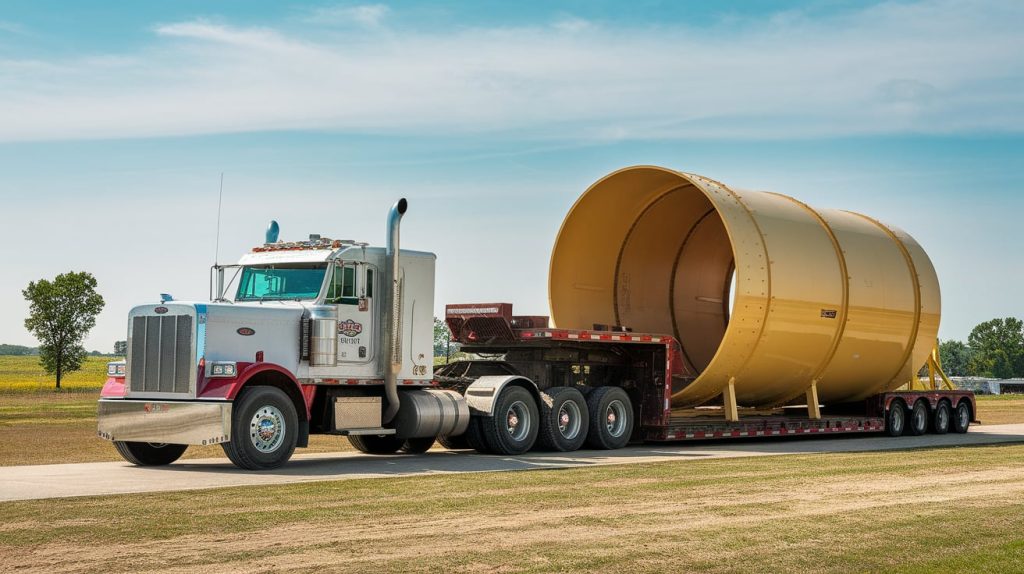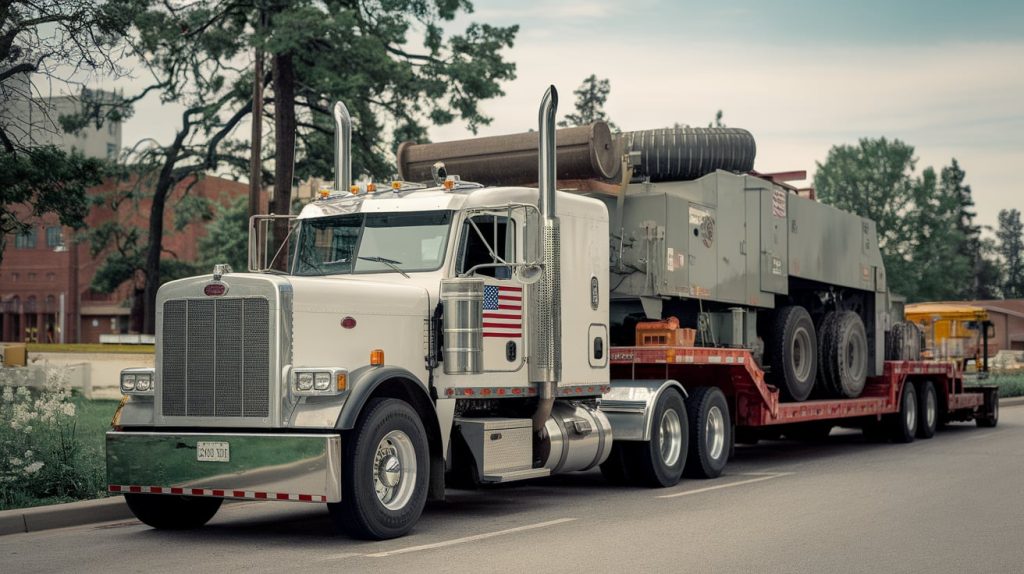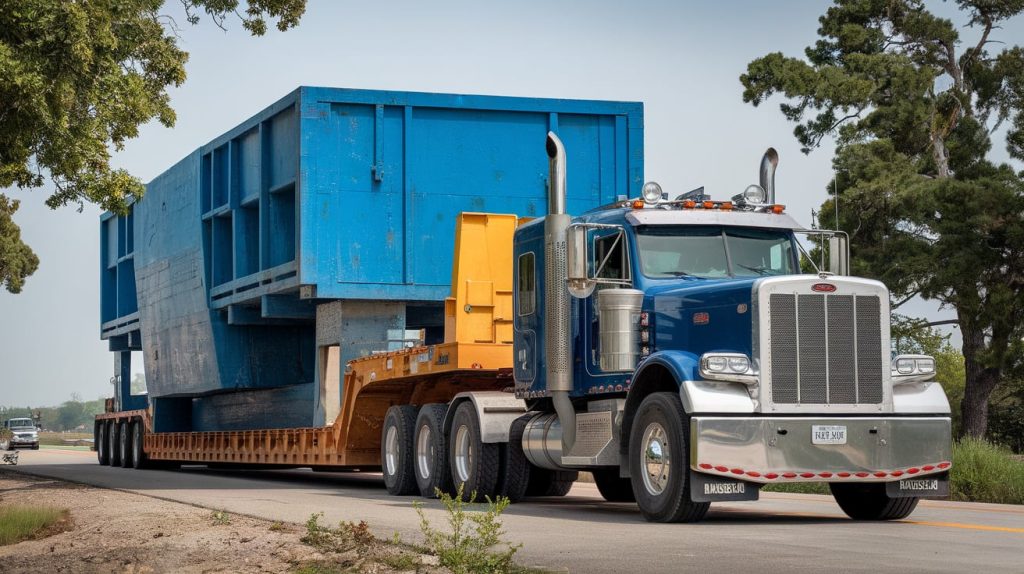Route Planning for Heavy Haul Trucking in California
Freedom Heavy Haul can offer expedited Pickup and Delivery for any size shipment anywhere in the USA. Contact us today for No Hassle, No Pressure Pricing.
Transporting oversized and overweight cargo across California requires careful planning to comply with state regulations, avoid restricted routes, and maintain efficiency. Whether you need to move heavy machinery, large construction equipment, or specialized freight, Freedom Heavy Haul ensures a seamless process. Understanding legal requirements, available routes, permit needs, and logistical challenges will help you get your load delivered safely and on time.
Route Planning for Heavy Haul Trucking in California and Legal Considerations
When transporting oversized loads, you must follow strict state and federal regulations. These laws help maintain road safety and prevent damage to infrastructure.

Weight and Size Limits
If your shipment exceeds standard limits, you will need special permits to transport it legally.
- Maximum Gross Vehicle Weight (GVW): 80,000 lbs (without special permit)
- Maximum Width: 8 feet 6 inches
- Maximum Height: 14 feet
- Maximum Length: 65 feet (single unit), 75 feet (articulated)
If your cargo is beyond these limits, Freedom Heavy Haul can handle the permit process and ensure compliance with California regulations.
Oversize/Overweight Permits
Your shipment may require a permit from Caltrans, depending on its dimensions and weight. These permits include:
- Single-Trip Permit: Covers a one-time move for a specific load.
- Annual Permit: Ideal for repeated transport of similar oversized freight.
- Superload Permit: Necessary for extremely large loads exceeding standard limits.
Getting the right permits can be time-consuming, but Freedom Heavy Haul simplifies the process for you, ensuring your shipment stays on schedule.
Local and County Restrictions
In addition to state regulations, many cities and counties have their own rules. Some roads may have lower weight limits, height restrictions, or prohibited truck access.
- Los Angeles, San Francisco, and San Diego require special routing in congested areas.
- Rural areas may have bridges or roads that cannot support oversized loads.
Before moving your freight, we verify all local regulations to avoid unexpected delays.
Key Factors in Route Selection
Choosing the right route ensures your load arrives on time while avoiding road restrictions, traffic congestion, and weather-related hazards.

Road Restrictions and Bridge Load Limits
California’s infrastructure includes tunnels, overpasses, and bridges that limit the routes available for oversized freight.
- California Bridge Formula: Determines how weight is distributed across axles.
- Height Restrictions: Overpasses and tunnels can limit options for taller shipments.
- Weight-Restricted Bridges: Older infrastructure may not support heavy loads.
With Freedom Heavy Haul, you don’t have to worry about these restrictions. Our team finds the safest and most efficient path for your shipment.
State and Interstate Truck Routes
California has designated truck routes designed to accommodate oversized freight. Common routes include:
- Interstate 5 (I-5): The primary north-south highway for heavy haul trucking.
- Interstate 10 (I-10): A major corridor linking ports to inland destinations.
- Interstate 80 (I-80): An east-west route crossing the Sierra Nevada, where weather can be a concern.
Using the right highways prevents unnecessary delays and ensures compliance with transportation laws.
Traffic and Roadway Conditions
California’s urban areas experience heavy traffic, especially during peak hours. Avoiding congestion can save time and fuel costs.
- Caltrans QuickMap: Offers real-time updates on traffic and road closures.
- Rush Hour Traffic: Los Angeles, San Francisco, and San Diego have significant congestion during morning and evening commutes.
Our team at Freedom Heavy Haul monitors traffic conditions and selects routes that minimize delays, ensuring your load reaches its destination as planned.
Weather Considerations
Weather conditions vary across California and can impact your shipment.
- Sierra Nevada (I-80, US-50): Snow and ice may lead to road closures.
- Central Valley (Hwy 99, I-5): Dense fog can reduce visibility.
- Coastal Routes (Hwy 1, US-101): Heavy rains can cause landslides or flooding.
By monitoring weather patterns, we adjust routes to keep your freight moving safely.
Equipment and Load Securement
The right equipment is essential for safely transporting your cargo. Choosing the correct trailer and securing your load properly prevents damage and ensures compliance with safety regulations.

Types of Trailers for Heavy Haul Loads
Your shipment’s size, weight, and shape determine which trailer is best. Options include:
- Lowboy Trailers: Best for heavy machinery with tall height.
- Step Deck Trailers: Ideal for loads that exceed standard trailer height.
- Extendable Flatbeds: Accommodate extra-long cargo.
At Freedom Heavy Haul, we provide the appropriate trailer for your specific freight, ensuring secure and efficient transport.
Cargo Securement and Safety Regulations
Your shipment must be properly secured to prevent shifting during transit. Federal regulations require:
- Chains and Straps: Secure heavy equipment in place.
- Blocking and Bracing: Keeps cargo from moving.
- Tarping Requirements: Protects freight from weather exposure.
Our team follows all safety protocols so your shipment arrives intact.
Escort Vehicles and Safety Requirements
For oversized loads, pilot cars and escorts help navigate difficult roads and warn other drivers.
When Escort Vehicles Are Required
Depending on your cargo’s size, you may need one or more escort vehicles.
- Pilot Cars: Required when width exceeds 12 feet or height surpasses 15 feet.
- Police Escorts: Necessary in urban areas or when crossing major highways.
- Height Poles: Ensure safe clearance under bridges and power lines.
Freedom Heavy Haul arranges escort services when needed, keeping your transport safe and compliant.
Cost Considerations for Route Planning
Transporting heavy freight involves multiple expenses, from permit fees to fuel costs.
Permit Costs and Fees
Each state-issued permit comes with a fee based on the load’s size, weight, and distance.
- Single-Trip Permits: Charged per trip, based on dimensions.
- Annual Permits: Cost-effective for repeat shipments.
Freedom Heavy Haul handles all permit applications so you don’t have to deal with the paperwork.
Fuel Efficiency and Route Optimization
Choosing the right route minimizes fuel consumption and operating costs.
- Smoother terrain reduces fuel usage.
- Avoiding congested areas lowers idle time.
Our team selects the best route for your shipment, reducing costs while ensuring timely delivery.
Technology and Route Optimization Tools
Advanced tools help find the most efficient and compliant paths for your heavy haul shipment.
GPS and Route Mapping Software
Truck-specific navigation software helps identify the safest and fastest routes.
- Rand McNally IntelliRoute: Offers truck-friendly navigation.
- Trucker Path: Provides live updates on road conditions.
- Google Maps (Truck Mode): Avoids restricted roads.
By utilizing these tools, Freedom Heavy Haul ensures your shipment avoids delays and unnecessary detours.
Weigh Station Bypass Systems
Bypass systems allow qualified trucks to skip weigh stations, reducing unnecessary stops.
- PrePass: Provides electronic weigh station clearance.
- Drivewyze: Alerts drivers of upcoming weigh stations.
Using these technologies speeds up deliveries and improves efficiency.
Heavy haul trucking in California requires thorough planning and expert handling. With Freedom Heavy Haul, you get professional logistics support, route optimization, and permit management, ensuring your shipment reaches its destination safely and on time. Whether moving construction equipment, industrial machinery, or specialized freight, our team is ready to assist you every step of the way.







